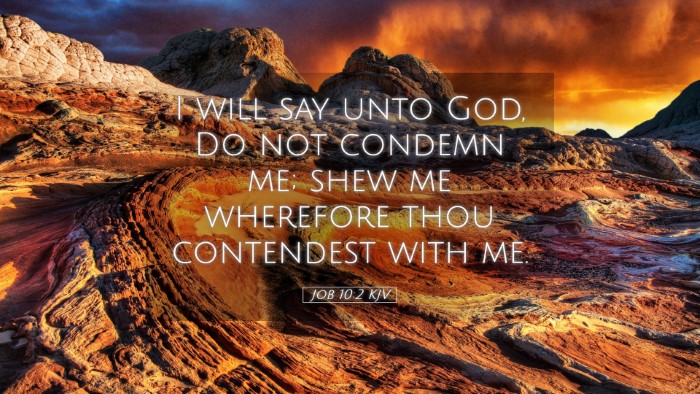Old Testament
Genesis Exodus Leviticus Numbers Deuteronomy Joshua Judges Ruth 1 Samuel 2 Samuel 1 Kings 2 Kings 1 Chronicles 2 Chronicles Ezra Nehemiah Esther Job Psalms Proverbs Ecclesiastes Song of Solomon Isaiah Jeremiah Lamentations Ezekiel Daniel Hosea Joel Amos Obadiah Jonah Micah Nahum Habakkuk Zephaniah Haggai Zechariah MalachiJob 10:2
Job 10:2 KJV
I will say unto God, Do not condemn me; shew me wherefore thou contendest with me.
Job 10:2 Bible Commentary
Commentary on Job 10:2
Job 10:2 states, "I say to God: Do not declare me guilty, but tell me what charges you have against me." This verse encapsulates Job's heart-wrenching plea as he navigates his profound sense of suffering and confusion in the wake of calamity. The insights drawn from various public domain commentaries elucidate the theological and existential layers present within this powerful statement.
Job's Plea for Justice
Job's declaration is both a challenge and a supplication. He seeks to understand the divine rationale behind his suffering. Matthew Henry emphasizes that Job directly addresses God, indicating his desire for clarity and divine engagement. Henry notes, "Job desires to be informed of the charges brought against him, intent on reconciling his understanding of God’s justice with his harrowing experience."
The Theology of Suffering
This verse opens a discussion on the nature of suffering and its relationship to sin. Albert Barnes interprets Job's stance as a desire for God to reveal the hidden reasons for his tribulations, emphasizing that Job positions himself not as an outright sinner but as someone seeking understanding. Barnes writes, "Job's appeal for knowledge of his alleged guilt serves as a profound inquiry into the reason behind his extreme suffering."
Dialogue with the Divine
Job’s approach reflects a deep yearning for an intimate dialogue with God. Adam Clarke elucidates the weight of Job's words, noting that Job's existence hinges on the unfolding of his relationship with God amidst adversity. Clarke states, "There is an implicit acknowledgment in Job’s plea that true understanding and communication with God are necessary for meaningful faith."
Self-Examination and Accountability
Job’s words also evoke themes of self-examination. He is not merely seeking to absolve himself; rather, he is engaging in a profound reflection on his life. Matthew Henry posits that throughout his afflictions, Job wrestles with the question of righteousness: "He desires not only to be vindicated but also to understand the divine principles at play in his suffering."
The Role of Divine Silence
Job’s declaration of, "Do not declare me guilty," highlights the anguish of divine silence during suffering. Albert Barnes points out that sometimes the absence of immediate answers from God can amplify one’s sense of isolation. He notes that Job seeks communication to alleviate his sense of abandonment: "The silence of God poses a significant burden when one is desperate for understanding amid suffering."
Justice and Divine Sovereignty
In addressing God with his grievances, Job displays an implicit belief in God’s justice. Job's call for God to reveal the charges against him suggests a foundational assumption that God operates within the parameters of justice and righteousness. Adam Clarke states, "Job, in his turmoil, acknowledges God’s sovereignty yet simultaneously seeks accountability, showcasing the tension between faith and understanding in moments of despair."
Application for Believers
Job 10:2 serves as a poignant reminder for believers facing trials. The insights gleaned from Job’s experience encourage an open and honest dialogue with God, even amid suffering. The commentaries illustrate that God welcomes our questions and doubts, inviting deeper faith as we seek His purposes. Clarke suggests, "It is through questioning that believers often gain the greatest insights into their faith and the workings of God."
The Assured Presence of God
Despite Job’s anguish, he is relentless in his pursuit of God’s presence. Matthew Henry reflects on the character of God, stating that while Job feels the weight of punishment, he simultaneously holds onto the hope of understanding and divine interaction: "Despite all his troubles, Job never loses sight of God’s presence as both judge and confidant."
Conclusion
Job 10:2 invites us into the complex realm of questioning God during our darkest hours. The confluence of the insights from Matthew Henry, Albert Barnes, and Adam Clarke encapsulates the deep theological reflections on suffering, divine justice, and the necessity of communication with God. This commentary urges us to engage with our faith actively, embracing our questions as pathways to deeper understanding. In doing so, we affirm that even through trials, the pursuit of divine truth and justice remains paramount.


